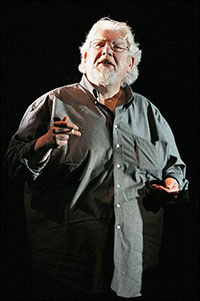
With a frame as big as his gifts as an actor, Mr. Griffiths was a striking presence on stage, his naturally fulsome, playful personality radiating through his physicality to dominate any scene he was in. Most film audiences knew him as Harry Potter's cruel Uncle Vernon in five of the Harry Potter films. But he also made an impression earlier on as the florid Uncle Monty in the 1980s British film classic "Withnail and I." More recently he repeated his stage success in the 2006 film version of Alan Bennett's play The History Boys.
That comic drama, set in an English public school in the 1980s, proved the central triumph of Mr. Griffiths' long career. Opening at the Lyttleton Theatre in London in spring 2004, it was instantly embraced by both critics and audience. Despite the seemingly limited scope of its subject matter — Bennett's bygone British school days — it became one of the most universally beloved stage works of its generation. It transferred to Broadway in spring 2006, and later played the West End and toured the world, winning just about every theatre award along the way.
Mr. Griffiths himself won the Tony, Drama Desk and Theatre World awards for his performance in the central adult role in the piece. He played the tricky role of Hector, a colorful general studies teacher whose students admire him so much they apparently forgive his attempts to sexually molest them while giving them lifts on his motorcycle. So likable was his opinionated creation that the audience overlooked Hector's faults as well.
"I was taught there were three kinds of authority, particularly in teaching," he said of playing Hector. "There's traditional authority, which is based on visible signs of rank and position. Then there's authority achieved by reason. The third kind is charismatic authority. 'Let's do this. It's a better idea than anything else.' It's what Hector is all about."
In person, the actor was very much like the character he played — witty, charmingly subversive, digressive in conversation and fully aware of (if slightly annoyed by) the rich panoply of life. His approach to acting assignments was often counter-intuitive, yet insightful. The key to playing boisterous Falstaff, he said, was, "Don't do jokes. Falstaff is actually a very well educated, scaly opportunist who's out for number one. That's what you must play first. He's an absolute bastard." Once, for research into a character he was playing in an English staging of Kaufman and Hart's play Once in a Lifetime, he traveled to New York and sat on the subway, listening to the voices around him.
| |
 |
|
| Richard Griffiths in Broadway's Equus. | ||
| photo by Joan Marcus |
With Ralph Richardson as a career idol, he began racking up Shakespearean credits, typically playing clown roles early on. He settled in Manchester, where he won lead parts in plays. His first big break in film was the 1975 movie "It Shouldn't Happen to a Vet." He went on to play key supporting parts in "The French Lieutenant's Woman," "Chariots of Fire," "Gorky Park," "A Private Function," "Greystoke—The Legend of Tarzan" and "Ghandi." More recently, he played King George II in "Pirates of the Caribbean: On Stranger Tides."
Following his success in The History Boys, he returned to the West End and Broadway in a revival of Equus, acting opposite his "Harry Potter" castmate Daniel Radcliffe. In spring 2012, he starred, alongside Danny DeVito, in a revival of The Sunshine Boys at the Savoy Theatre in London. That production had been announced to play Los Angeles in the coming year.
In everything he did, Mr. Griffiths' charmingly cantankerous personality seeped through. He made headlines in 2006 when he stopped a matinee Broadway performance of The History Boys when an audience member's cell phone went off. "I can't compete with these electronic devices," he said. "Now you were asked nicely by the stage manager [to turn them off]. You were told that it's against the law." He then said he would start the scene again and, if interrupted once more, wouldn't continue. "You've been warned," he admonished.
The audience relished its scolding.
When the scene began anew, responding to the Headmaster's inquiry about why Hector locked the classroom door during lessons, Mr. Griffiths uttered the scripted line, "I don't want to be interrupted." The audience burst into laughter and applause.










